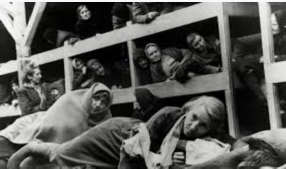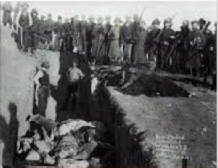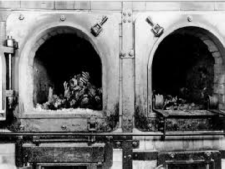|
CLICK BUTTON TO GO |
|
|
|
|
|
|
|
|
|
|
|
|
|
Videos |
|
|
|
|
|
|
|
|
|
|
|
|
|
PART 1 T O P I C |
|
|
|
|
|
|
|
|
|
|
|
|
|
|
|
|
|
|
JewishWikipedia.info
|
The Fight for
|
Active Holocaust |
THE FIGHT FOR HOLOCAUST RESTITUTION
CONTINUES 75 YEARS LATER
Canadian Jewish News Mark Mietkiewicz - June 1, 2018
Just three of names appearing on a list of dormant Swiss bank accounts, probable victims of Nazi persecution. Since the original Swiss claims process was established in 1997, restitution of the assets of Holocaust victims has resulted in a great deal of coverage and controversy. Many lawsuits seeking restitution have resulted in settlements or agreements, each with its own rules and claims procedures. Although most deadlines have expired, there are a number of restitution funds which are still open.
In two very recent developments, the Trump administration has signed an act that requires the U.S. State Department to report what European countries are doing to compensate Holocaust survivors. And earlier this year, approximately 25,000 Algerian Jews were recognized as Holocaust survivors by the German government and are eligible for a one-time payment. I will provide details and other active claims in an upcoming column.
Please note that there are different claims procedures depending on the type of restitution you are claiming (such as for victims of slave labour, for people trying to retrieve deposited assets, for people who are heirs to claim old Swiss insurance policies, etc.) Each type of claim requires completion of a detailed form. Volunteer organizations from some local Jewish Federation and social service agencies worldwide are available to assist claimants with all the paperwork. You may also want to get professional assistance to sort your way through the claim maze – and to ensure that you do not invest much time, effort and hopes in a claim which has little chance of success. (Please note that I am not one of those professionals and do not have further information beyond what I am presenting here.)
One early and interesting article to summarize the struggle for Jewish reparations is also one of the most controversial. In 2001, Gabriel Schoenfeld, at the time senior editor of Commentary, took a look at the history of reparations and the early debates. (For example, in the 1950’s Menachem Begin, leader of Israel’s Herut Party, held street demonstrations to denounce the Israeli government for accepting German “blood money.”) Schoenfeld suggested that in addition to “stoking the fires of anti-Semitism on the right,” at least some of the claims had been settled under duress by banks or corporations anxious to avoid unceasing notoriety.
Schoenfeld’s article drew a great deal of response including a letter from then U.S. Deputy Secretary of the Treasury Stuart Eizenstat, a supporter of compensation for survivors of the Holocaust and their families. Eizenstat was organizer of 1988 Washington Conference – Principles on Nazi-Confiscated Art.
Just how many Holocaust survivors are alive today? Just after Elie Wiesel passed away in the summer of 2016, there were an estimated 100,000 Jews who were in camps, ghettos and in hiding under Nazi occupation. That was down from about a half million in 2014.
Writing in TheHIll.com, Gideon Taylor, chair of operations for the World Jewish Restitution Organization, explains why the fight for restitution is critical – even at this late date.
“Of course, the restitution of property cannot provide full justice for Holocaust survivors — nothing can. Yet restitution serves as a powerful recognition of the deprivation of property rights and a testament to countries’ efforts to acknowledge history. At a time when too many Holocaust survivors live with inadequate social care, restitution can provide the means for survivors to live with the dignity that they deserve.”
In Latvia, writes Taylor, “hundreds of communal properties, including synagogues and schools that belonged to a once-thriving Jewish community, remain unreturned. In Croatia and Slovenia, non-citizens are excluded from legislation that provided restitution for confiscated property. Bosnia has yet to address the issue.” And then there is Poland, “the sole European Union member without a national program to return or provide compensation for private property stolen during the war and its aftermath.”
The fight for restitution has been a difficult and often combative one but I would like to conclude with the story of Christophe Meili. In 1977, Meili was a security guard at the Union Bank of Switzerland when he discovered bank employees shredding what appeared to be important Holocaust-era documents.
After he handed those documents over to Jewish leaders, Meili was fired by the banks and received death threats for his efforts. Meili and his family eventually fled to the United States and in order to offer him refuge, then president Bill Clinton signed special legislation granting them permanent residency in the U.S.
In order to thank him for his honesty and sacrifice, Meili and his family were presented with an $18,000-a-year scholarship at Chapman University in Orange, California. The award came from a group of 650 Holocaust survivors.
ACTIVE HOLOCAUST RESTITUTION FUNDS:
NOT TOO LATE TO APPLY FOR SOME
Canadian Jewish News, Mark Mietkiewicz -
July 5, 2018 (published March 6 2019)
In my first column on Holocaust restitution, I looked at the struggle for Jewish reparations over the years. Although the deadline for most programs has passed, there are a surprising number for which it’s not too late to apply.
The best website to focus on is run by the Conference on Jewish Material Claims Against Germany. The Claims Conference is the central body which negotiates on behalf of world Jewry for compensation and restitution for victims of Nazi persecution and their heirs. And as it puts it, “to provide a measure of justice for Jewish Holocaust victims, and to provide them with the best possible care.”
As the site points out, “there is no fee to apply for compensation from the Claims Conference. You do not need to pay anyone for application forms and you are not required to obtain assistance in completing and/or submitting application forms. If you need assistance to apply, you may contact the Claims Conference – without any fee.” (Please do contact them if you have questions. I have no further information beyond what is included in this column.) The Claims Conference uses a single application form – available in English, German, Hebrew, Russian and French – for all programs.
These programs are still in effect. (The following are summaries. See the website for full details.)
• The Article 2 Fund – Lifetime monthly compensation for a range of survivors including survivors who were citizens of Western European countries at the time of their persecution and were in concentration camps or ghettos or who lost a family member; those incarcerated in a ghetto or lived in hiding or under false identify; Jews incarcerated in special camps in Austria, the copper mines in Bor, Yugoslavia, and in labor battalions for Hungarians on the Ukrainian front.
• The Central and Eastern European Fund – similar to the Article 2 Fund allows some of the most persecuted Nazi victims in Central and Eastern Europe and the former Soviet Union to receive compensation for the first time.
• The Hardship Fund – A one-time payment for Holocaust survivors from the former Soviet bloc countries who emigrated to the West.
• The Child Survivor Fund – A one-time payment of €2,500 to Jewish Nazi victims who were in a concentration camp, a ghetto, or in hiding for at least 6 months in Nazi-occupied or Axis countries.
• The Orphan Fund – A one-time payment of €2,556 to those living in former Soviet bloc countries who were born in 1928 or later and were orphaned due to Nazi persecution (both parents were killed due to persecution.)
The Claims Conference is also involved in these active restitution agreements:
• Payments to Aid Austrian Survivors – Provides financial assistance to Austrian Holocaust victims living in need worldwide.
• Romanian Survivor Relief Program – A one-time payment (expected to be a few hundred U.S. dollars) toward the restitution of communal properties wrongfully taken from Jewish communities of Romania during and after the Second World War. Please note that you must have an annual individual income below CAD $33,000 to qualify. Completed applications for this program must be received by the Claims Conference in New York by November 30, 2018.
• Czech Benefits for Survivors – Holocaust survivors who were Czech Republic citizens and were persecuted on a racial and religious basis during the Second World War, including victims of Nazi persecution, may be eligible to receive either an additional allowance to an existing pension and for those not receiving a pension, a lump sum payment from the Czech government. Payment ranges from U.S. $6,000 to nearly $40,000.
I was surprised to see that agreements are still being negotiated. Only this year, the German government recognized approximately 25,000 Algerian Jews who may be entitled to compensation as victims of Nazi persecution. Jews who resided in Algeria between July 1940 and November 1942 may be eligible for a one-time payment of €2,556.
“This is a long overdue recognition for a large group of Jews in Algeria who suffered anti-Jewish measures by Nazi allies like the Vichy Regime,” said Greg Schneider of the Claims Conference. “The Vichy government subjected these people to restrictions on education, political life, participation in civil society and employment, abolishing French citizenship and singling them out only because they were Jews.”
Unfortunately, it must be noted that over the years the Claims Conference has itself been criticized for high operating costs. As well, in 2013, a Claims funds director was sentenced to eight years in prison for $57 Million in fraud against the organization. U.S. Attorney Preet Bharara called Semen Domnitser and two accomplices guilty of “unthinkable crimes.”
In addition to negotiating the above agreement, the Claims Conference also provides assistance to grassroots Holocaust organizations around the world. Their Canada page lists initiatives in Toronto, Montreal, Ottawa, Vancouver and Winnipeg.
It also profiles Edmonton’s Elza Gorbanov. As a child in Donetsk, Ukraine, Elza and her family fled the Nazis to Kazakhstan. When Donetsk was liberated in 1943, the family returned to find that their home had been ransacked and nothing was left. They struggled for years and in 1998, Elza and her husband started to receive food packages funded by the Claims Conference. Due to nearby fighting between the Ukrainian government and the pro-Russian forces, she immigrated to Canada in 2015. Here, she continues to receive assistance from the Claims Conference and from Jewish Family Service of Edmonton.
Next time, why new restitution laws are still making headlines and generating controversy over six decades after the Holocaust.
THE CONTINUING FIGHT
FOR HOLOCAUST RESTITUTION – PART 3
Canadian Jewish News, Mark Mietkiewicz - July 16, 2018
Although the Second World War ended over 70 years ago, the fight over restitution is very much alive today.
My first column on this topic focused on the struggle for Jewish reparations over the years. I then looked at restitution funds which are still active and are accepting applications. In today’s column, I examine how governments are still grappling with legislation that could determine whether survivors or their heirs are compensated for the horrors of the Holocaust.
As recently as 2007, less than 20 per cent of the value of Jewish assets stolen by the Nazis and their collaborators has been restored according to the Jewish Political Studies Review. “Even the highly publicized resurgence of restitution efforts since the mid-1990s resulted in the return of only three per cent of Holocaust property,” said the Review.
In order to address this, in May of this year, the United States passed the Justice for Uncompensated Survivors Today (JUST) Act. The Act mandates that the State Department report on the progress of 47 countries that pledged in 2009 to return or pay restitution for stolen property or assets from Holocaust victims.
Although law does not give the United States powers to litigate to recover property, its reporting will apply pressure on signatories of the 2009 Terezin Declaration on Holocaust Era Assets and Related Issues. Its passing also coincides with headlines about the one European country which has not passed legislation to compensate former owners for assets seized – Poland. As the AP points out, “Warsaw sees itself as the key target of the law. … Polish Foreign Minister Jacek Czaputowicz says he believes that the U.S. pressure through the JUST Act unfairly sets Jewish claimants above non-Jewish ones, creating tensions within Polish society.”
“This position of the (U.S.) Congress is not good because it wants some privileges for the Jews, for the Jewish community, but not for the Poles. I think that the Poles who live in the U.S. may feel hurt by that,” Czaputowicz said in an interview with The Associated Press.
A Polish-American group fighting the legislation called it “profoundly UNJUST”, opposing the Act’s reporting “on acts of certain foreign countries.” “Poland must not be held responsible for the genocide and property expropriations conducted by her German and Soviet occupiers.”
Haaretz.com quoted media reaction in Poland criticizing the law. “Finish this madness; the subject could cost Poland tens of millions” read a headline on a large Polish newspaper. “The Holocaust industry is attacking Poland,” read another.
“The JUST Act is a drop of justice in what was an ocean of injustice, as it will ultimately help in the restitution of Nazi-confiscated assets stolen during the Holocaust,” said U.S. Senator Chuck Schumer.
As mentioned, Poland is the only country in Europe which has not passed legislation to compensate owners whose private property was confiscated under Nazi and later Communist rule. After over 20 failed attempts at legislation, the Polish government introduced a restitution law last October. That legislation has been criticized by Polish survivors of the Holocaust and their heirs.
Their concerns:
• Compensation would be limited to the victims themselves and “first line heirs” – spouses, children and grandchildren but not extended family. Only Polish citizens would be eligible for compensation.
• It would be restricted to heirs of property-owners who lived in Poland at the time of nationalization. That would affect survivors who left at the end of the war whose property was late nationalized under Communist rule.
• It would be capped at 20 per cent of the property’s pre-war value or 25 per cent in Polish government bonds.
• And filings must be made within one year of the law being enacted after which property would be transferred to the Polish Treasury.
Articles in tabletmag.com and The New York Times explain the fallout from the proposed legislation. Critics say the bill would discriminate against virtually all survivors who are not current citizens of Poland. Supporters say the bill treats all claimants – Jew and non-Jew – equally.
“On what basis should Poland decide that those with Jewish ancestors get compensated, whereas Belarussians, Poles, Ukrainians or Crimean Karaites, or Tatars and Germans—all of whom used to live here before the war—shouldn’t be compensated?” Law and Justice leader Jaroslaw Kaczynski asked. “It means that the descendants of poor Poles are supposed to pay the descendants of those who were rich?”
Counters critic David Tilles, a dual British-Polish citizen with experience of the restitution process noted, “There is an expectation that, given all the suffering, restitution should be made easier, particularly for Polish Jews forced to leave by the Holocaust and the subsequent Communist regime’s anti-Semitic purges.”
Those sentiments were echoed in March in a bipartisan letter co-signed by 59 U.S. senators welcomed by the World Jewish Restitution Organization which called “on Poland urgently to address this historic wrong.”
The outcry seems to have had an effect. The Polish Justice Ministry has announced that it is reviewing its draft legislation.
Next time, I conclude my look at Holocaust restitution with one of the most difficult fights, the return of valuable artworks seized by the Nazis.
HOLOCAUST REPARATIONS
TODAY AND THE FUTURE



THE
INCREDIBLE
STORY OF THE JEWISH PEOPLE
